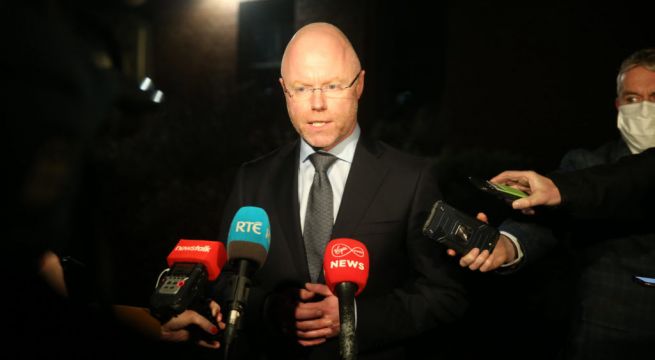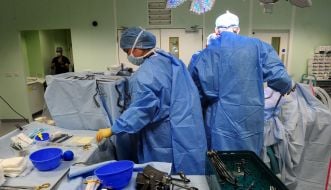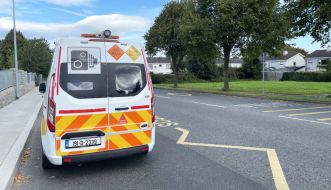Updated 10am
The Minister for Health is expected to update senior ministers on Wednesday morning on the overcrowding issues facing Irish hospitals.
It comes after the highest number of people waiting on trolleys was recorded on Tuesday, and as the Health Service Executive (HSE) advised people to consider attending their GP or minor injury units before an emergency department.
On Tuesday, Stephen Donnelly said it is likely that pressure on hospitals due to a surge in respiratory illnesses will get worse in the coming weeks.
Speaking to reporters after visiting emergency departments at St Vincent’s and Beaumont Hospital, Stephen Donnelly said: “The advice I have from the chief medical officer is the modelling is difficult in terms of being accurate.
“However, what I can tell you is the HSE’s view today, when I met them, was that this is likely to get worse, we are likely to see more pressure."
931 patients are on trolleys in our emergency departments or elsewhere in our hospitals today.
Overcrowding isn't just confined to a small number of hospitals, it is impacting most. We need immediate and decisive action from the HSE and Government.
👉https://t.co/r1TcUdRmB2 pic.twitter.com/CagkK0YCk2— Irish Nurses & Midwives Organisation (@INMO_IRL) January 3, 2023
Speaking on RTÉ radio's Morning Ireland on Wednesday, emergency medicine consultant Dr Peadar Gilligan has called for the implementation of the full capacity protocol at all hospitals with emergency departments.
Dr Gilligan, who is based at Beaumont hospital in Dublin, told RTÉ radio’s Morning Ireland that implementing the protocol would mean that rather than housing patients in the emergency department who need to be on a ward, those patients would be moved to ward areas “where they may well be in a bed or a trolley awaiting further care, but that is a safer environment.
“It is safer to move one or two patients to a ward rather than treat the emergency department like it has rubber walls."
The situation in Beaumont hospital was “particularly challenging” at present, he said, with 34 patients currently in the emergency department who had been assessed and deemed appropriate for admission but there was no hospital bed for them.
“Essentially that means that 100 percent of the capacity of the ED is occupied by patients who are waiting for a hospital bed,” he added.
Dr Gilligan said the solution was to develop capacity: 5,000 acute beds are needed, and they need to be delivered in a timely manner.
When asked if patient lives were at risk because of the current conditions, Dr Gilligan replied: “Definitely.”
Overcrowding in emergency departments meant delays in diagnosing and treating heart attacks and strokes and delivering antibiotics.
“Definitely there are clinical consequences to our failure to develop the capacity that the system clearly needs. Lives are definitely at risk. The reality is we don't have the beds in the system that we need.”
Emergency attendances have been fuelled by a rapid increase in flu, Covid-19 and RSV (respiratory syncytial virus) cases, with nearly 1,500 people currently in hospital with those illnesses.
The Irish Nurses and Midwives Organisation (Inmo) said 931 patients were counted as waiting on trolleys in Irish hospitals, the highest number without a hospital bed since the trade union began the count in 2006.
Of those, 767 were on trolleys in emergency departments while 164 were on trolleys elsewhere in hospitals.
Limerick University Hospital declared a major internal incident on Monday after an “unprecedented” number of people presented seeking emergency care.
Children are more likely than adults to catch the flu. The nasal spray flu vaccine is for all children aged 2 to 17. Make an appointment with your GP or pharmacy: https://t.co/55wpYBQqDC#FluVaccine | #YourBestShot pic.twitter.com/joOnf3mk0C
— HSE Ireland (@HSELive) January 2, 2023
In a statement on Tuesday, the HSE asked those who need medical care or assessment “to consider all options” before going to an A&E during what “is going to be the busiest ever period experienced by the health service”.
It said: “While this surge of winter virus infections was predicted and planned for, the trends being seen are following the more pessimistic of predicted models and also appear to be increasing earlier than had been hoped.
“While some patients will regrettably experience long wait times in our emergency departments, urgent patients will always be prioritised for treatment and care.”
Although RSV cases fell for several weeks, they are now also surging.
Figures show there are almost 700 people in hospital with Covid-19, with 78 new cases confirmed in the past 24 hours.
Damien McCallion, the HSE’s chief operations officer, said the “unprecedented combination” of very high levels of respiratory illnesses has led to stress on hospitals.
The HSE expects the rise to continue for “a number of weeks”, which will “seriously impact” hospitals.
Mr McCallion asked people with flu-like symptoms to check undertheweather.ie in the first instance, secondly for people to consult their pharmacist or GP, and thirdly for them to attend a minor injury unit before considering attending an emergency department.
“Those who believe they may be seriously ill and require emergency care should of course come to hospital, but we would urge others to consider seeking support from pharmacists, GPs, GP out-of-hours services and minor injury units,” he said.
“These services have emergency responses in place for patients presenting with respiratory and other urgent health issues.”
Inmo general secretary Phil Ni Sheaghdha said the numbers require “immediate and serious intervention” from the Government, and called on a mask mandate to be introduced in congregated settings.
“We do not need those at the top to describe how we got here; we need to know what exactly the plan is from today until the end of February.
“Just telling people to avoid hospitals is not a plan or indeed safe.
“Our members are treating patients in inhumane and often unsafe conditions.”
Mr Donnelly said the official advice to the Government is that mask mandates are not required, but that they would keep the situation under review.
The crisis in our hospitals is getting worse driven by rapidly increasing Covid, Flu & RSV cases & a lack of capacity in many hospitals. A senior medic has described UHL as a national basket case & conditions as inhumane. The Oireachtas Health committee needs to meet urgently.
— David Cullinane T.D. (@davidcullinane) January 3, 2023
“I spoke to the chief medical officer in the last few hours on exactly that,” Mr Donnelly said.
“So I don’t anticipate any change coming in terms of the public health advice from the chief medical officer.
“The public health advice to Government, to me at the moment, it is not a move to mask mandates, but obviously we will keep the situation under review on a daily and on a weekly basis.”
Chief medical officer Breda Smyth has urged people to wear masks on public transport and to stay at home if they have flu-like symptoms over the coming weeks in an effort to reduce transmission.
People are also encouraged to get a flu or Covid-19 booster vaccine if they are due one.
On Thursday, a second booster vaccine was made available to people aged 18 to 49, which can be booked through the HSE website.
With additional reporting from Vivienne Clarke







